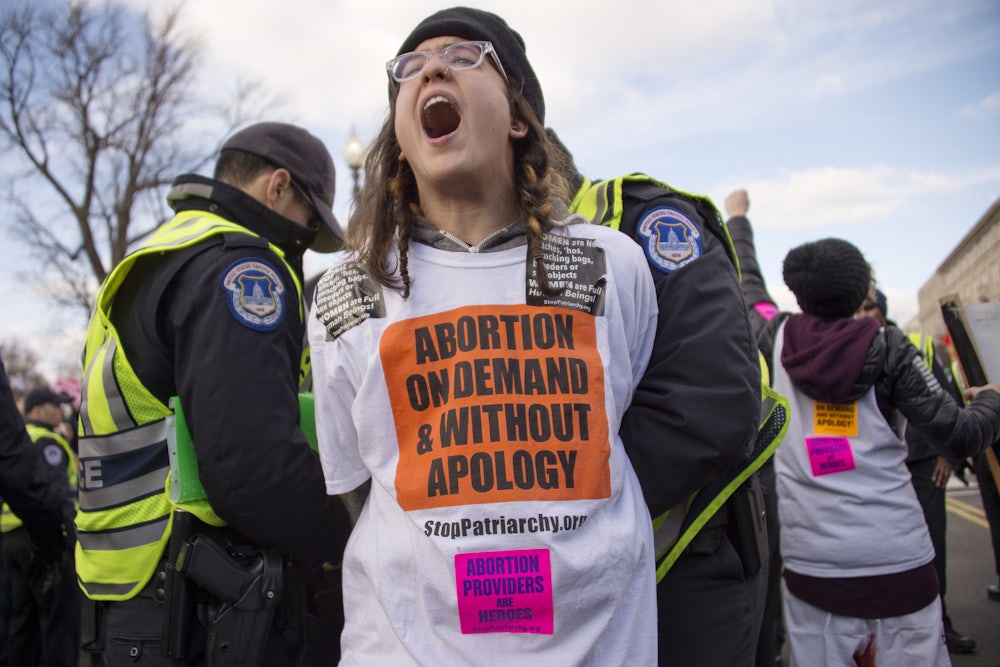I don’t remember the name of the doctor who performed my abortion. I don’t even remember what she looked like.
Maybe it’s because she didn’t actually “perform” a procedure. She answered my questions; she wrote my prescription. But she wasn’t there when I went to the pharmacy. She wasn’t there when I took the pills. She wasn’t there while I thrashed around on my couch for two hours, screaming in pain and vomiting.
That wouldn’t matter in Alabama, where Governor Kay Ivey on Wednesday signed the most extreme anti-abortion bill in the country. The “Human Life Protection Act,” which makes no exception for rape or incest, defines abortion as “the use or prescription of any instrument, medicine, drug, or any other substance or device with the intent to terminate the pregnancy of a woman.” A doctor caught performing one—at any stage of a pregnancy—would be charged with Class A felony.
If this were the law in New York when, at age 19, I chose to get an abortion about five weeks into an accidental pregnancy, my doctor could have been arrested. I may have been the one who put the pill in my mouth, who handled the fetal tissue, and who cleaned up the blood. But since my doctor was the one who prescribed the pill, she’d be the one facing up to 99 years in prison.
As Joyce White Vance, a former U.S. attorney in Alabama, explained in The Washington Post, the “draconian nature of the bill is its point—because its sponsors aren’t just looking to prohibit abortion in Alabama. They are looking for a clean vehicle to take to the Supreme Court. They want to overturn Roe v. Wade, supplanting it with something that makes state laws prohibiting abortion the law of the land.”
And yet, the law—which likely won’t go into effect without a long legal fight—is not quite as draconian as it could have been. Alabama’s male lawmakers could have sought to punish the women themselves. But they knew that throwing women in jail for doing what they please with their own bodies would have been seen as too cruel. So they targeted doctors instead. Cowards.
But you can see their twisted logic. Most abortion opponents probably don’t regard women who get abortions as criminals, but rather victims—not just of a broadly permissive society, but of a specifically godless doctor. It is much easier to see a medical professional as morally depraved, and deserving of consequences, than a pregnant woman. She didn’t know any better! She was brainwashed! She’s just hysterical!
Too many Americans still think of abortion as a medieval procedure in which a white-coated doctor stands at the edge of an exam table, armed with clamps, ready to pry a nearly fully formed baby from a woman’s womb. This is not reality. About a quarter of abortions in the United States are so-called medication abortions, in which the woman takes one or more pills to induce an abortion, usually prior to nine weeks of gestation and in the comfort of their home. And most surgical abortions, which require a doctor and occur in a clinic or other medical setting, are not being done to viable fetuses. More than 90 percent of abortions in the United States are performed at or before 13 weeks of gestation. (The earliest a fetus can survive is after 20 weeks, and the odds are extremely low until 25 weeks.)
But even if all abortions were surgical abortions performed by doctors, Alabama’s choice to punish the doctor and not the patient would still be cowardly. They’re not just trying to mask the horror of punishing women by punishing their doctors instead; they’re trying to guilt women into submission. We are taught, from a young age, to suppress our own needs if they might burden other people. So whereas we might be willing to get an illegal abortion at the risk of going to jail ourselves, we’d be less willing to do so if it put our doctor at risk.
I may not remember my abortion doctor’s name, but I value what she did for me. I remember wishing she had been there when my uterine lining began to shed—not so she could comfort me, but so I could scream-vomit at her lying face. She had made me feel so comfortable with my decision earlier that day. She made me feel in control. She assured me that I was making the choice that was right for me.
But when the pain passed, so did my anger at her, because she was right. My 19-year-old self did make the right choice, and ten years later I am grateful that she helped me make it. If I knew her name, I would call her and thank her.
